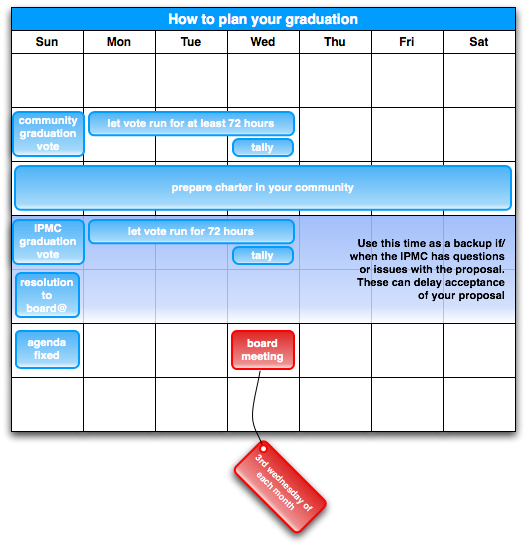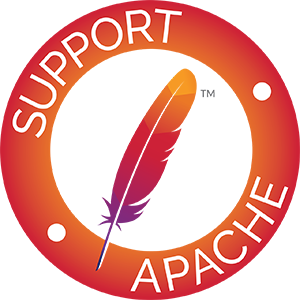Top level projects are created by the Board. The Incubator
Project Management Committee (IPMC) can therefore only
recommend to the Board that the project is ready to
graduate to a top level project.
Graduation to a top level project requires:
- a charter for your project
- a positive community graduation
VOTE
- a positive IPMC recommendation
VOTE
- the acceptance of the resolution by the Board
This process can take a while, since it typically sparks
some discussion inside the community and possibly in the
IPMC.
Here's an estimated timeline for the graduation process.
It should help you understand when you should start
ramping up your community to get timely graduation and
make the process smooth.

For each event we scheduled one or two weeks. Even though
a VOTE
is usually limited to 72 hours, you should prepare
for discussion and possibly having to cast a revote with a
revised proposal.
A community needs to be willing to govern itself
before it can become a top level project. A good way
to demonstrate this is through a free VOTE (by the
community) on the graduation proposal.
This VOTE is not a requirement but is recommended. It
is unlikely that IPMC
members will vote to approve graduation unless the Mentors
and community positively express their readiness for
graduation. It is wise to notify the incubator
general list that the community vote is starting. Please do not Cc the
vote to the general list as that creates confusion, instead you can either:
- FWD the [VOTE] e-mail to the general list, or
- Send a different copy to the general list indicating that a graduation community [VOTE] is in progress
Preparing a Charter
So, in this case a suitable Board resolution should be
drawn up by the community advised by the
Mentors.
Committers can access the podling template for
resolutions in the committers
svn repository. Also, resolutions are included in
the Board minutes, which are posted publicly
here . These contain numerous examples. Good
examples include:
Click here for a template of this proposal to use.
The original proposal and the status document should
be consulted when creating this document. Projects
evolve over time and some deviation from the original
proposal may well prove acceptable. The Board
resolution is the ultimate definition of the scope of
an Apache project. So, it is important that it
reflects the vision for the project as it appears on
the eve of graduation.
A good resolution is neither too narrow nor too broad.
If the project's scope is too narrow, then its
activities will be unnecessarily constrained. If a
project's scope is too broad then it may lack focus
and suffer from governance issues.
If you read these resolutions you also see that you
need to appoint a Chair
for your project. It is up to the
PPMC to choose one
person to act as the chair after graduation.
The Recommendation Vote
The resolution should be proposed on the general
incubator list before a VOTE
is started to allow feedback. Once a consensus has been reached, a VOTE
should be started on the same general incubator list by a member of the PPMC proposing
that the IPMC
recommends the resolution to the Board.
Submission of the Resolution to the Board
Top level projects are created by a resolution by the
Board.
Once the resolution has been
finalized and consensus reached, it should be
submitted to the Board. For inclusion in the agenda
for the next meeting, the resolution should be
submitted at least 72 hours before that meeting. A
calendar for meetings is available.
Business for the Board should be submitted by a post
to the board mailing list. Posting from
an Apache address is recommended. Mixing public and
private lists on a post is not recommended.
The board list is private.
The usual netiquette
for Apache private lists should be observed. So, it is
recommended that only the podling and IPMC
private
lists are CC'd (rather than the general incubator
list). Please treat responses with appropriate
confidentiality.
The submission should include:
- A clear subject (for example Establish Foo TLP)
- A brief introduction
- The name of proposed VP
- Links to the
VOTE threads
- Summary of the
VOTE results
- The resolution text
For example:
--
From: <you _at_ apache dot org>
To: <board _at_ apache dot org>
CC: <<project>-private _at_ incubator dot apache dot org>
Subject: proposed resolution: establish <project> TLP
Dear Apache Board,
<Project> is ready for graduation out of the incubator. So, please
consider the draft resolution below at your next meeting.
<thank you, best regards, personal note if you wish, etc etc>
<your name>
--
References:
Home: <project home page>
Vote by project: <link to vote thread on project list>
Vote by incubator: <link to vote thread on general list>
Resolution draft:
<<resolution goes here, 72 characters wide,
indent with 4 spaces>>
--
<your e-mail sig, if you have one>
Please try to keep the board list traffic low. Do not
submit reminders or ask whether messages have been
received on the list. Apache
Members have access to the Board
archives and may
observe Board meetings. To follow the progress of a
resolution, please ask a friendly Member or Director.
Press Releases for new TLPs
Once there is clear consensus that the recommendation will happen,
a member of the PPMC should contact ASF Marketing & Publicity at
press(at)apache(dot)org if your project is interested in a
formal press release announcing your graduation. This should be done
roughly at the same time that the board resolution is sent.
Subprojects are accepted by a Project Management
Committee. The Incubator Project Management Committee
needs to approve the graduation of the podling to a
subproject.
A community needs to be willing to govern itself
before it can become a top level project. A good way
to demonstrate this is through a free
VOTE
(by the community) on the graduation proposal.
This VOTE is not a requirement but is recommended. It
is unlikely that IPMC
members will vote to approve graduation unless the Mentors
and community positively express their readiness for
graduation. When this vote starts, you should notify the Incubator and the Sponsor. Please do not Cc the
vote to these lists as that creates confusion, instead you can either:
- FWD the [VOTE] e-mail to the list(s), or
- Send a different copy to the list(s) indicating that a graduation community [VOTE] is in progress
Subproject Acceptance Vote
A formal VOTE
by the Project PMC
to accept the podling as a subproject is a
prerequisite. Sometimes, projects may feel that the
podling has grown too big and would be better as a
top level project. The Chair of the project is the
right contact.
Graduation Approval Vote
To graduate as a subproject, the Mentors
should start a VOTE
thread on the general
list proposing that the
IPMC signs off the graduation of the podling as a
subproject. This VOTEs should only be started once the
project has VOTEd to accept the subproject.



 Guide to Successful Graduation
Guide to Successful Graduation